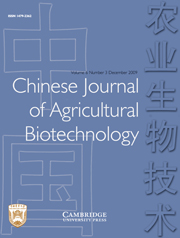Article contents
Expression of β-agarase I DagA in prokaryotic cell and its activity identification
Published online by Cambridge University Press: 30 October 2009
Abstract
The DagA gene and DagA(▽), which is a DagA gene encoding sequence without signal peptide, were cloned from genome DNA of Pseudoalteromonas atlantica 19262 by polymerase chain reaction (PCR). After ligation with pET21 vector, DagA and DagA(▽) were respectively expressed in Escherichia coli ER2566 using molecular chaperones DsbC and FkpA. A strain of ER2566-pET21a-DagA(▽)-DsbC was screened as a highly effective expressing system in the form of an inclusion body that had the target protein with up to 60% total bacterial protein. DagA protein was renatured and purified by dissolving it in 8 mol/l of urea, using Ni-NTA resin affinity chromatography and refolding using the urea gradient method. DagA with a molecular weight of ~30.8 kDa was identified by sodium dodecyl sulphate polyacrylamide gel electrophoresis (SDS-PAGE) and had the ability to digest agarose. In a pH range of 4.8–6.8, DagA maintained a bioactivity greater than 60%, with 5.8 being the optimum pH, and it exhibited activity at temperatures from 37°C to 60°C, with 55°C being the optimum temperature.
- Type
- Research Papers
- Information
- Copyright
- Copyright © China Agricultural University 2009
References
- 1
- Cited by


